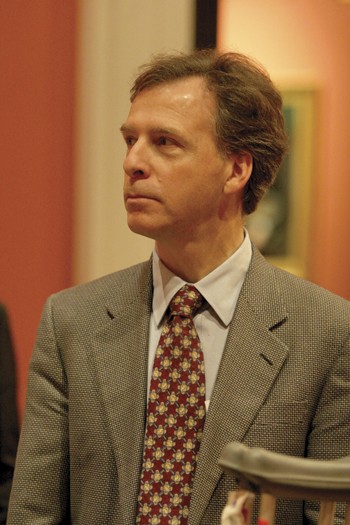
Foreign policy scholar Robert Litwak. (Christina Parrish)
Author and U.S. foreign policy scholar Robert Litwak spoke on campus in a lecture hosted by the Tower Center on Wednesday. He discussed how the attacks of Sept. 11 influenced the way that the U.S. currently handles international affairs.
According to Litwak, Sept. ll exposed America’s vulnerability, caused a shift in its strategy for international relations and left an unresolved contradiction of behavior change versus regime change in rogue states.
“9-1l ushered in a new area of vulnerability,” Litwak said.
The author of “Regime Change” added that while the terrorism attacks redefined threat for the U.S., they did not change how U.S. approaches international relations but reinforced existing U.S. foreign policy.
Litwak said that Sept. 11 made an alliance between Russia, China and the U.S. for the first time since World War II because the global economy was affected.
According to Litwak, President Bush argued that rogue states, terrorist regimes that act outside of their state’s borders, such as Iraq “were less likely to be deterred and more likely to use weapons of mass destruction.”
However, Litwak said that the U.S. made a large mistake in Iraq by focusing on regime change versus a change in behavior. He firmly believes that dissuasion can not affect rogue state intentions so long as the U.S. objective is regime change.
The division of many U.S. allies occurred in Oct. 2002 when the U.S. not only acted preemptively by expanding the size of its military because of imminent threat and also because the U.S. acted preventively against potentially imminent threats.
“If preventative action is permissible it will cause chaos,” Litwak said.
Litwak explored concepts of societal change responsible for the U.S.’s strategies toward regime change in Iran and North Korea.
The Bush administration’s current concept of societal change is a “popular up-swell of an alienated society to overthrow its regime,” Litwak said.
Litwak said that the timeline for action toward Iran and North Korea’s regimes is unknown, but the timeline for action toward their nuclear programs is “urgent and immediate.”
He agreed with a New York Times reporter that the U.S. is “three years, eight bombs, and one test too late,” concerning the nuclear program in North Korea.
“When a country focuses on regime change, the regime begins to focus on survival and not on negotiation,” Litwak said.
He urged that the U.S. shift its dynamic from U.S. versus Iran to the U.S. and the world versus Iran. He said that the U.S. has two options with Iran. One is to bomb the country, and one is to negotiate.
Litwak is currently the Director of International Security Studies at the Woodrow Wilson International Center for Scholars. He is a former member of the National Security Council for the White House. Litwak received his bachelor’s degree in political science from Haverford College and his doctorate in International Relations from the London School of Economics.








